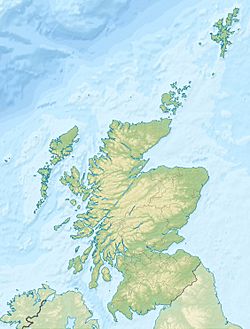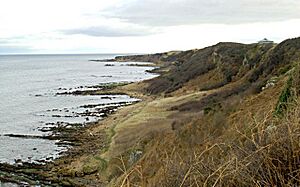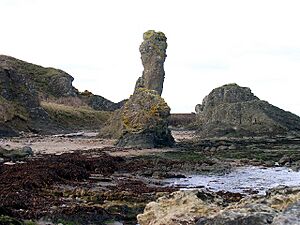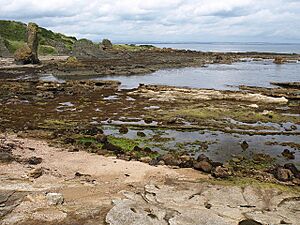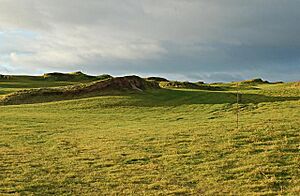Kinkell, Fife facts for kids
Kinkell was a historic area of land located to the east of St Andrews in Scotland. Long ago, during the Middle Ages, Kinkell was home to several important buildings. These included a small church (chapel), a hospital, a dovecote (a building for pigeons), and a castle or large manor house.
The castle at Kinkell became a very important secret meeting place for religious groups called conventicles. This happened after the House of Stuart royal family was put back on the throne of Scotland and England. Today, not much is left of these old buildings. However, the name "Kinkell" lives on in places like Kinkell Ness (a headland), Kinkell Braes (hillsides), Kinkell Byre (a barn), and Kinkell Farm. Modern buildings now stand on the braes, including a caravan park, a waste treatment plant, a farm, and a golf course.
Contents
Exploring Kinkell's Location
The Kinkell Braes are hillsides that stretch east from St Andrews, right along the coast of the North Sea. The rocks here are very interesting, looking like they've been twisted and piled up. One special rock formation at the bottom of the cliff is a large grey sandstone mass called the Maiden Rock.
There's also a big natural cave called Kinkell Cave. It goes deep into the hillside and has a smooth rock roof. People think it might have been used as a hiding place or a fort a long time ago.
Kinkell Ness and Harbour
If you go past the headland known as Kinkell Ness, you'll find a small natural harbour or creek called Kinkell Harbour. This sheltered spot was a good place for boats to find safety from strong winds coming from the southeast. The old Kinkell castle once stood on the hillside right above this harbour.
Next to the harbour, you can see a famous rock formation called the "Rock and Spindle." This is what's left of an ancient volcano! It has a tall, pillar-like rock (the "stack") and a base that looks like a spinning wheel, made from twisted columns of volcanic rock called basalt.
Kinkell's Ancient History
The name "Kinkell" is believed to come from the Chapel of St Anna. This chapel was built around 875 AD by a bishop of St Andrews named Kellach.
Long ago, a group of Christian monks called the Culdees (or Céli Dé) lived in the area. They were known for their simple and strict way of life. The Culdees had a community at Kilrymont monastery in St Andrews and served in the Church of St Mary on the Rock. These monks owned the lands of Kinkell in the 1170s.
The Hospital and Castle
Kinkell was also home to St Nicholas Hospital. This hospital cared for people with leprosy, a serious skin disease, until at least 1438. Later, a book from the 1500s called the Book of Assumptions mentioned that the leader of St Mary's church (the Provost) was in charge of the Kinkell lands.
The castle or manor house of Kinkell was located a little way inland from a famous rock formation known as the Rock or Needle of St Andrews. Legend says that the Scottish hero William Wallace once fought and killed three Englishmen who had taken shelter there. Over the centuries, the Kinkell castle was owned by several important families, including the Moubrays, Hepburns, Monypennys of Pitmillie, and finally the Hamiltons.
Secret Meetings at Kinkell Castle
In the late 1600s, the owner of Kinkell castle was Alexander Hamilton. He was a very dedicated Covenanter. Covenanters were Scottish Protestants who had signed agreements (covenants) to protect their Presbyterian church from the king's control. Because of his beliefs, Alexander Hamilton often let ministers who were hiding from the law stay at his castle. This made Kinkell a frequent location for secret religious meetings called conventicles.
One famous meeting happened in early 1674. A well-known preacher named John Blackadder came to speak. So many people attended that they filled two rooms, a long hallway, and even the castle courtyard!
The wife of Archbishop Sharp, who was against the Covenanters, sent the town's local soldiers (militia) to break up the meeting. Some young men and troublemakers also joined them, hoping for some excitement. But when the militia arrived and saw how many people were there, they didn't do much. They just sent for more help and then went back to town.
The very next day, Blackadder returned to preach again. This time, an even bigger crowd from St Andrews came to listen. When the Archbishop asked the town's leader (the provost) to send the militia again, the provost replied that he couldn't. Why? Because the militia members themselves had gone to hear the preaching!
Kinkell in Modern Times
By the 1700s, the old Kinkell castle was falling apart. At the beginning of the 1800s, some parts of the castle and chapel could still be seen on the hillside above Kinkell harbour. However, a book from 1884 described the site as "merely a rocky face, studded with blooming whins in summer, and a row of blasted ash-trees." This means it was mostly just a rocky area with gorse bushes and some damaged trees.
In the 2000s, a new golf course was built in the area. It covered a large part of Kinkell farm, which is on the hillside above Kinkell harbour. Even though they searched, no trace of the old castle was found during the construction. Finding the castle would have made the golf course more interesting, but it also would have added costs because of the need for archaeological digs.


